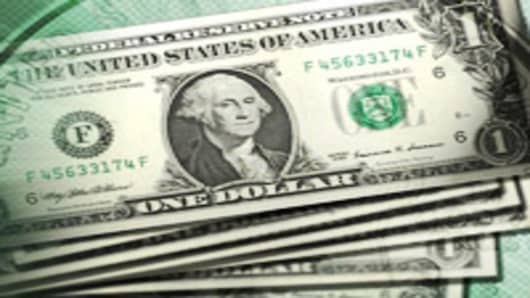The dollar’s steep decline has dented overseas demand for US securities, but a dramatic exodus from dollar assets is unlikely, analysts say.
For years, the United States has relied on foreign investors to help fund its large deficits with the purchase of Treasury securities. But with financial institutions roiled by a credit crisis and the dollar on the ropes, the investment climate has deteriorated significantly in recent months.
Comments by a Chinese official recently that Beijing should take advantage of the appreciation of strong currencies to offset the depreciation of the weak dollar shook up already jittery investors, but failed to alarm those familiar with the workings of central banks.
"Central banks are not in the business of international financial instability," says Edwin (Ted) Truman, a senior fellow at the Peterson Institute and a former assistant US Treasury secretary for international affairs. "They may be losing some money in the opportunity cost sense, but to react to try to cover some of that loss would be mindless," added Truman, who was also a senior Federal Reserve Board economist.
For central banks with large amounts of dollars to invest from the proceeds of international trade, a sharp move to divest from dollars would be against their nature -- and interests.
"Central banks are looking at liquidity and risk," says Drew Matus, senior economist at Lehman Brothers. "They are not paid to take huge risks. They just want their money back."
Furthermore, any significant sales by any number of banks in a short period of time would probably weaken the dollar even more and heighten existing losses.
Japan and China are the top overseas holders of US Treasurys, ($585.6 billion and $400.2 billion, respectively, as of August), followed by the United Kingdom ($244.0 billion).
Greater Dollar Worries in Recent Months
The debate about overseas holdings of US Treasurys is hardly new and typically surfaces when the dollar is weak. The dollar has been falling for some five years, hitting record lows against several currencies along the way, but its slump in recent months has been most worrisome, especially given the likelihood of further weakening if the Federal Reserve continues to cut interest rates amid worsening credit conditions and a looming recession.
To be sure, overseas investors are looking more at other asset classes and markets. China, for instance, has invested in Africa and Australia and has taken small stakes in private equity deals.
"Where’s the money going? We think it could be going into gold, staying in euros or staying in Asia," says Joe Quinlan, chief market strategist at Bank of America. "I think there’s a growing home bias among foreign investors."
That said, a major withdrawal from the unrivalled depth and liquidity of the US Treasury market, however, is not in the cards for either central banks or private investors, analysts say, citing good overseas demand at last week’s auction of 30-year bonds at the Treasury’s quarterly refunding.
Kevin Giddis, managing director of fixed income capital markets at Morgan Keegan, says there was 32 percent indirect bidding, a category that is seen as a good proxy for central banks and other overseas buyers. It was the best showing since the February refunding. That suggests "no loss of foreign investor interest," Giddis says.
Wariness aside, Quinlan says Treasurys remain attractive. The August Treasury International Capital report may have showed net selling of bonds and notes by foreign account holders, but four of the top five bidders –- China, the UK, Brazil and oil exporters –- had increased their holdings from a year ago.
TIC data for September, due out Friday Nov. 16, may indicate further shifts of preference, especially with the dollar’s continued decline.
Some are predicting a repeat of August, when Treasurys, equities and corporate bonds all showed net declines. Others expect another decline for Treasurys but gains for equities and corporate bonds, reflecting the September stock market rebound from August's declines.
"Going forward we can probably expect more of a shift into U.S. equities and corporate debt on the part of overseas investors," says Matus of Lehman. "We wouldn’t expect to see it overnight, but over time, an entity that has significant exposure to US Treasurys could shift more into those assets."
That, of course, may depend partly on the stock market’s performance for the rest of the year, particularly given its swift and brutal decline in early November.


